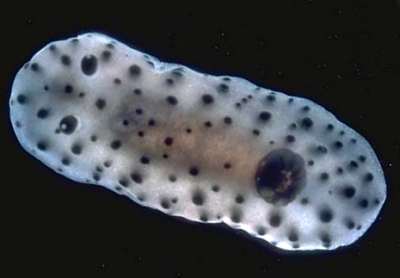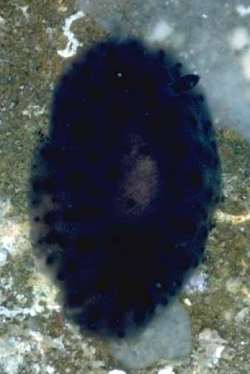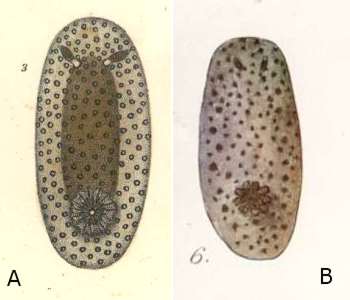
Hallaxa fuscescens
(Pease, 1871)
Order: NUDIBRANCHIA
Suborder: DORIDINA
Superfamily: EUDORIDOIDEA
Family: Actinocyclidae
DISTRIBUTION
Widespread Indo-West Pacific
PHOTO
PHOTOS: Upper right: Arrawarra Head, Coffs Harbour, nthn New South Wales, Australia. intertidal, on Halisarca. 16 March 1982. Live length 18 mm. AM C115783. Lower left: Another animal photographed on Halisarca at same time. Photos: BIll Rudman. A. Doris fuscescens Pease, 1871: Plate 4, fig.3, 3a-c. B. Kentrodoris nigra Risbec, 1928: Plate 2, fig.6
This species has a translucent body with low rounded black tubercles scattered over the mantle. The bipinnate gills are arranged in a tight, upright circle around the anal papillae. In Gosliner & Johnson's (1994) review of Hallaxa, a new species Hallaxa atrotuberculata is proposed for this species based on specimens from Madagascar and the Marshall Islands. I have also found this species in Tanzania, Australia and New Caledonia. There appear to be at least two earlier names for this species
Synonymy.
Doris fuscescens Pease, 1871b: 14, Pl.4, fig.3, 3a-c.
Kentrodoris nigra Risbec, 1928a: 91, Pl.2, fig.6., Risbec, 1953: 37.
Hallaxa nigra: Pruvot-Fol, 1930: 231.
Hallaxa atrotuberculata Gosliner & Johnson, 1994: 159-163, Figs 1A, 6, 7.
Pease (1871) described Doris fuscescens, from Maiao Is, Society Islands, which is identical in colour and has the typical gill arrangement of this group. The relationship is further confirmed by the description of the head region as `Mouth notched beneath; no distinct head or labial tentacles'. Risbec (1928) described Kentrodoris nigra from New Caledonia. The description is based entirely on the external features. The mantle is translucent gray with rounded black tubercles. The bipinnate gills form a tight circle, and the buccal tentacles are described as `lobiform', which are characteristic of Hallaxa. Pruvot-Fol (1930) in fact placed it in the genus Hallaxa.
This species clearly has a wide Indo-West Pacific distribution, and as I report in a separate message [#17533 ] it feeds on a species of halisarcid sponge. The appropriate name for this species would appear to be Hallaxa fuscescens.
- Pease, W.H. (1871) Descriptions of new species of Nudibranchiate Mollusca inhabiting Polynesia. No.2. American Journal of Conchology. 7 (1): 11-19
- Pruvot-Fol, A. (1930) Diagnose provisoires (incomplètes) des espèces nouvelles et liste provisoire des mollusques nudibranches recueillis par Mme. A. Pruvot-fol en nouvelle Calédonie (Ile des Pins). Bulletin du Museum National d'Histoire Naturelle Paris, 2: 229-232.
- Risbec, J. (1928) Contribution a l'étude des nudibranches Néo-Calédoniens. Faune des Colonies Francaises, 2(1): 328, pls.1-12.
- Gosliner, T.M. & Johnson, S. (1994) Review of the genus Hallaxa (Nudibranchia: Actinocyclidae) with descriptions of nine new species. The Veliger, 37(2): 155-191.


Rudman, W.B., 2006 (March 31) Hallaxa fuscescens (Pease, 1871). [In] Sea Slug Forum. Australian Museum, Sydney. Available from http://www.seaslugforum.net/factsheet/hallfusc
Related messages
-
Hallaxa fuscescens from Mayotte Island
From: Matthias Deuss, September 2, 2009 -
Hallaxa fuscescens found sthn Queensland
From: Gary Cobb, November 25, 2008 -
Hallaxa fuscescens from the Philippines
From: Erwin Koehler, July 10, 2007 -
Hallaxa fuscescens from Heron Island, Queensland
From: Julie Marshall, August 23, 2006 -
Hallaxa fuscescens - feeding observations
From: Bill Rudman, August 21, 2006 -
Rediscovery of Hallaxa fuscescens
From: Bill Rudman, August 21, 2006
